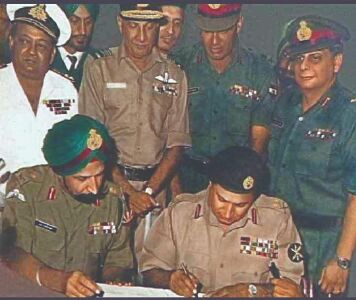Safeguarding the Republic
Celebrating 50 years of democracy’s victory over tyranny

Today, on December 16, India and Bangladesh celebrate Vijay Diwas, or 'Victory Day' to commemorate India's victory over Pakistan during the 1971 war, also known as the Bangladesh liberation war.
On this day, Lt General AAK Niazi along with 93,000 Pakistani troops surrendered to the Indian Armed Forces, led by Lt General JS Aurora at the Ramna Race Course, now Suhrawardy Udyan in Dhaka, after a momentous 13-day war.
This article celebrates the long-standing bilateral ties between the two countries and commemorates the valour of the Indian Armed Forces, which was instrumental in making this day what it is.
Revisiting history
2020 is particularly important since it marks the birth centenary of Sheikh Mujibur Rahman, considered the founding father of Bangladesh and affectionately referred to as 'Bangabandhu', while 2021 marks the 50th year of the war of 1971. This war saw India stepping-up to defend the democratic freedoms of the people of her soon-to-be liberated neighbouring country.
To commemorate this stellar page in the history of the two nations, Indian Armed Forces are commemorating the 'Swarnim Vijay Varsh' commencing December 16 2020, with a wide range of public outreach activities, within limitations imposed by the pandemic. These include live streaming of Band concerts, the inauguration of a Tri-Services Commemoration Website, the release of the commemorative song 'Vijay Geet' and Stamp, Illumination of buildings, and most importantly, the lighting of the 'Victory Flame' by Hon Prime Minister Shri Narendra Modi.
This historic 'Victory Flame' will traverse across the length and breadth of the country, marking important battle theatres, felicitating war veterans and their families en route, and celebrating the sacrifice of Indian combatants who had laid down their lives to defend and secure the freedoms, liberties and tomorrows of our Bangladeshi brethren.
In a similar gesture of remembrance, from 2017 onwards, Bangladeshi freedom fighters, also called 'Muktijoddhas', had visited India and their Indian counterparts, narrated stories from that time, and were felicitated as part of Vijay Diwas celebrations at Kolkata's Fort Williams. Likewise, Indian war veterans had also visited Bangladesh. Further, in a rare gesture of gratitude and goodwill, 'Muktijoddhas' had also met the families of Indian soldiers deceased during the war.
For what it is worth
However, to anyone reading about the actions by Indian combatants, it would seem that 1971 was a cakewalk.
After all, merely four Indian Air Force Hunter aircraft destroying an entire Pakistani armoured regiment in Longewala, or Indian Army soldiers doing their victory dance atop captured Pakistani Patton tanks in the aftermath of the Battle of Basantar, or Indian Naval ships decimating Karachi harbour not once but twice, would easily make one believe that it was all so easy!
However, nothing can be farther from the truth. The enemy had every intention to cause maximum damage, as had become evident from the horrific pogroms and genocides that had taken grip of Bangladesh in the months preceding the war. Credit, therefore, is due not only to the gallantry, professionalism, and grit of the Commanders and soldiers on-ground, but also to the flawless planning, dynamic leadership, and improvisation of unimaginable magnitude at higher Leadership echelons. This combination of Jointmanship and sound strategic thinking led to the victory of soldiers, sailors and airmen, who were motivated by their sangfroid leadership and righteousness of their cause.
The present
Today, India and Bangladesh's relationship is anchored in culture, language, history, and shared values of democracy, secularism, and countless other commonalities.
It stands to attention that India was the first country to recognise Bangladesh as a separate and independent state, establishing diplomatic relations with the country immediately after its independence in December 1971. Further, "Indo-Bangladesh relationship today is based on sovereignty, equality, trust, understanding and a win-win partnership that goes far beyond a strategic partnership," a senior Indian government official commented. There are currently more than 50 bilateral institutional mechanisms between India and Bangladesh in areas of security, trade & commerce, power & energy, transport & connectivity, science and technology, defence, rivers, and maritime affairs.
The bedrock of these historical ties goes back to the amicable exchanges between Indira Gandhi and Sheikh Mujibur Rahman during the years preceding Bangladesh's War of Liberation, and subsequently resulted in the Indo-Bangladesh Treaty of Friendship, Peace and Cooperation. It is said that mutually faced adversity breeds the best friendships. This holds most true for India and Bangladesh, whose relationship was forged on the anvil of this 'Just War'.
Afterword
Celebrating past victories is as crucial as keeping a look-out for the emergence of similar adversities in the future. In this regard, one can be sanguine, both neighbours are certainly better poised than last time.
The writer is a Lieutenant Commander presently posted at Naval Headquarters, New Delhi. Views expressed are personal and do not represent official position of the Indian Navy or the Government of India



